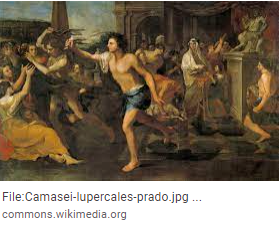Seems like everybody is jumping on the Saint Valentine's bandwagon. From PBS, to the Biden Administration to The New Yorker. Or is it Lupercalia? St. Valentine’s Day started as a Catholic holiday honoring two men named Valentine who were martyred in consecutive years during the Roman festival of Lupercalia - a bloody, violent and perverse pagan celebration including animal sacrifice and random coupling under the guise of “love.”
 |
| Democrats in Congress Celebrating Infanticide |
One Saint Valentine was supposedly a Roman priest who performed secret weddings against the wishes of the authorities in the third century. Imprisoned in the home of a noble, he healed his captor's blind daughter, causing the whole household to convert to Christianity and sealing his Before being tortured and decapitated on February 14, he sent the girl a note signed “Your Valentine.” Others says St. Valentine was a Roman priest and physician who suffered martyrdom during the persecution of Christians by the emperor Claudius II Gothicus about 270. He was buried on the Via Flaminia, and Pope Julius I reportedly built a basilica over his grave. Other narratives identify him as the bishop of Terni, Italy, who was martyred, apparently also in Rome, and whose relics were later taken to Terni. Whether two Valentines, or one. While details are vague, the common understanding is that the Catholic holiday was intended to celebrate true love in marriage.
At the end of the 5th century, Pope Gelasius I forbid the celebration of Lupercalia and is sometimes attributed with replacing it with St. Valentine's Day. According to Catholic Online, Pope Saint Valentine, officially known as Saint Valentine of Rome, a third-century Roman saint is widely celebrated on February 14 commonly associated with courtly love to celebrate and to honor true love in marriage
"Although not much of St. Valentine's life is reliably known, and whether or not the stories involve two different saints by the same name is also not officially decided, it is highly agreed that St. Valentine was martyred and then buried on the Via Flaminia to the north of Rome.
In 1969, the Roman Catholic Church removed St. Valentine from the General Roman Calendar, because so little is known about him. However, the church still recognizes him as a saint, listing him in the February 14 spot of Roman Martyrolgy."
So, what is the difference between Lupercalia Love and Saint Valentine's love? 1 Corinthians 12:31—13:13 tells us exactly what Saint Valentine's love is:
13 If I speak in the tongues[a] of men or of angels, but do not have love, I am only a resounding gong or a clanging cymbal. 2 If I have the gift of prophecy and can fathom all mysteries and all knowledge, and if I have a faith that can move mountains, but do not have love, I am nothing. 3 If I give all I possess to the poor and give over my body to hardship that I may boast,[b] but do not have love, I gain nothing.
4 Love is patient, love is kind. It does not envy, it does not boast, it is not proud. 5 It does not dishonor others, it is not self-seeking, it is not easily angered, it keeps no record of wrongs. 6 Love does not delight in evil but rejoices with the truth. 7 It always protects, always trusts, always hopes, always perseveres.
8 Love never fails. But where there are prophecies, they will cease; where there are tongues, they will be stilled; where there is knowledge, it will pass away. 9 For we know in part and we prophesy in part, 10 but when completeness comes, what is in part disappears. 11 When I was a child, I talked like a child, I thought like a child, I reasoned like a child. When I became a man, I put the ways of childhood behind me. 12 For now we see only a reflection as in a miror; then we shall see face to face. Now I know in part; then I shall know fully, even as I am fully known.
13 And now these three remain: faith, hope and love. But the greatest of these is love.o only one person.om via beheading on February 14
Clearly the "love" the New Yorker describes In the Seduction of Ulysses, is not the love Corinthians describes. More like Lupercalia Love:
It writes: "Since its publication, a century ago, James Joyce's epic has acquired a fiercesome reputation for difficulty. But its great subject, sappy as it may seem, is love."
PBS has been on the shiny new #DIE - Diversity, Inclusion and Equity. But the Church invented it 2000 years ago. The old worn out DIE encourages everyone to share his or her gift and develop it to the maximum. The new shiny PBS DIE wants the maximum benefit for the least effort. James Joyce exemplifies the old DIE with his book Finnigans Wake's character HCE: Here Come Everybody. The New Yorker Piece reminds me of 1 Corinthians 1:27: "But God chose the foolish things of the world to shame the wise; God chose the weak things of the world to shame the strong." Or even King Solomon: the wisest man to ever live, builder of the temple, beautiful poet and national leader--he was a man who seemed to have it all then he turned against God. In Kings 11:4 we read:
When Solomon was old his wives had turned his heart to strange gods,
and his heart was not entirely with the LORD, his God,
as the heart of his father David had been.
By adoring Astarte, the goddess of the Sidonians,
and Milcom, the idol of the Ammonites,
Solomon did evil in the sight of the LORD;
he did not follow him unreservedly as his father David had done.
Solomon then built a high place to Chemosh, the idol of Moab,
and to Molech, the idol of the Ammonites,
on the hill opposite Jerusalem.
He did the same for all his foreign wives
who burned incense and sacrificed to their gods.
The LORD, therefore, became angry with Solomon,
because his heart was turned away from the LORD, the God of Israel,
who had appeared to him twice
(for though the LORD had forbidden him
this very act of following strange gods,
Solomon had not obeyed him).
Reads like the transformation of Kings Solomon is what the elites of today are going through
What's in your house: Lupercallia or Saint Valentines"


No comments:
Post a Comment